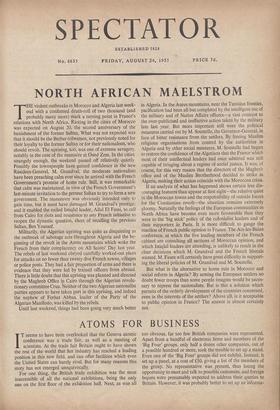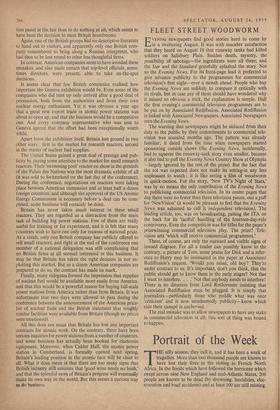ATOMS FOR BUSINESS
IT seems to have been overlooked that the Geneva atomic conference was a trade fair, as well as a meeting of scientists. At the trade fair Britain ought to have shown the rest of the world that her industry has reached a leading position in this new field, and can offer facilities which even the United States can barely rival. But for many reasons this story has not emerged unequivocally. .
For one thing, the British trade exhibition was the most inaccessible of all the national exhibitions, being the only one on the first floor of the exhibition hall. Next, as was all too obvious, far too few British companies were represented. Apart from a handful of electronic firms and members of the `Big Four' groups, only half a dozen other companies, out of a possible hundred or more, took the trouble to set up a stand. Even one of the 'Big Four' groups did not exhibit. Instead, it set up a panel, at a cost of £50, giving a list of the members of the group. No representative was, present, thus losing the opportunity to meet and talk to possible customers, and foreign buyers were presumably expected to address their queries to Britain. However, it was probably better to set up an informa- tion panel at the fair than to do nothing at all, which seems to have been the decision in most British boardrooms. Again, one of the British groups had no descriptive literature to hand out to visitors, and apparently only one British com- pany remembered to bring along a Russian interpreter, who had then to be lent round to other less thoughtful firms.
In contrast. American companies seem to have avoided these mistakes, and also made certain that top-level officials, some- times directors, were present, able to take on-the-spot decisions.
It seems clear that few British companies realised how important the Geneva exhibition would be. Even some of the companies who did turn up only arrived after a good deal of persuasion, both from the authorities and from their own nuclear energy enthusiasts. Yet it was obvious a year ago that a great new export trade in atomic power stations was about to open up, and that the business would be a competitive one. And every company representative who was sent to Geneva agreed that the effort had been exceptionally worth while.
Apart from the exhibition itself, Britain lost ground in two other ways : first in the market for research reactors, second in the matter of nuclear fuel supplies.
The United States gained a great deal of prestige and pub- licity by paying some attention to the market for small research reactors. Their 'swimming pool' reactor on show in the grounds of the Palais des Nations was the most dramatic exhibit of all (it was sold to Switzerland on the last day of the conference). During the conference, negotiations on reactors were taking place between American companies and at least half a dozen foreign countries, and although the approval of the US Atomic Energy Commission is necessary before a deal can be com- pleted, some business will certainly be done.
Britain has never taken much interest in these small reactors. They are regarded as a distraction from the main task of building big power stations. Few of them are really useful for training or for experiment, and it is felt that many countries wish to have one only for reasons of national pride. As a result, only one British company has publicly offered to sell small reactors, and right at the end of the conference one member of a national delegation was still complaining that no British firms at all seemed interested in this business. It may be that Britain has taken the right decision in not ex- ploiting this market. But as a dozen American companies are prepared to do so, the contrast has made its mark.
Finally, many delegates formed the impression that supplies of nuclear fuel would be available more easily from America. and that this would be a powerful reason for buying full-scale power stations from America rather than from Britain. It was unfortunate that two days were allowed to pass during the conference between the announcement of the American price- list of nuclear fuels and the British statement that roughly similar facilities were available from Britain (though no prices were mentioned).
All this does not mean that Britain has lost any important contracts for atomic work. On the contrary, there have been serious inquiries for power stations from a number of countries, and some business has actually been booked for electronic equipment. Moreover, when Calder Hall, the atomic power station in Cumberland, is formally opened next spring, Britain's leading position in the atomic race will be clear to all. What it does mean is that there are too many signs that British industry still assumes that 'good wine needs no bush,' and that the splendid news of Britain's progress will eventually make its own way in the world. But this seems a curious way to do business.



































 Previous page
Previous page